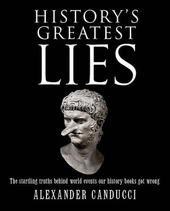
|
History's Greatest Lies: The Startling Truths Behind World Events our History Books Got Wrong
Paperback / softback
Main Details
Description
Each chapter in this work points out a lie that is held as a common truth in history, and summarises what we think we know. Then the author shreds the lie to academic ribbons using the latest findings on each subject. Each true story sets the record straight, revealing timeless ulterior motives, and introducing important personalities who successfully (and suspiciously) avoided responsibility in common history texts.
Author Biography
William Weir is the author of several history books, including Written with Lead, Fatal Victories, A Well Regulated Militia, Soldiers in the Shadows, Turning Points in Military History, Fifty Weapons that Changed Warfare, and Fifty Military Leaders Who Changed the World. He lives in Guilford, Connecticut.
ReviewsBookviews.com, February 2009"I love reading history, so I was naturally intrigued by William Weir's History's Greatest Lies in which he neatly dispatches many of the most treasured stories to be found in the schoolbooks and repeated elsewhere. Weir relates that Emperor Nero did not fiddle as Rome burned because the fiddle or violin wasn't invented until the 16th century. His enemies are the source of that story and he had plenty of them. Paul Revere did his best to alert the extensive Colonial militia that the British were coming, but they got to him first, holding him for awhile as the word was spread by a variety of means. The Bastille was stormed because the crowd wanted to get at its store of gunpowder. Its political prisoners actually lived in comfortable quarters. All things considered, this book provides a very interesting new look at history." Publishers Weekly, February 9, 2009"In historian Weir's newest, he examines and debunks popular historical myths, trimming the proceedings in a textbook-like assemblage of color illustrations and sidebars. Weir cites numerous sources while restoring historical accuracy to popular legends, including Nero's fiddling, the "unconquerable" Afghanistan and Paul Revere's ride. Though largely well-written and meticulously researched, Weir stretches mightily to incorporate some of his investigations; his look at Jesse James in particular rings false, citing an "American Robin Hood" myth that Weir may as well have made up (has anyone ever argued that James wasn't a vicious murderer and thief?). A few more stories like this unfortunately detract from the strong entries; especially illuminating are the passages on Wyatt Earp and John Dillinger. Though there are surprises to be found for history buffs, knowledgeable readers will find enough off-track editorializing and fluff to question some of Weir's more salient and interesting points."
|